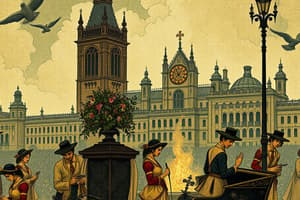Podcast
Questions and Answers
What was the primary focus of Max Weber's sociological analysis?
What was the primary focus of Max Weber's sociological analysis?
- Individual actions oriented toward others (correct)
- Economic systems
- Social structures
- Political institutions
Max Weber frequently cited Emile Durkheim in his work.
Max Weber frequently cited Emile Durkheim in his work.
False (B)
What kind of background did Max Weber have?
What kind of background did Max Weber have?
He was born to well-off parents and had an intellectual upbringing.
Max Weber's mother, Helene Fallenstein, led an __________ lifestyle.
Max Weber's mother, Helene Fallenstein, led an __________ lifestyle.
In which university did Max Weber complete his law doctorate?
In which university did Max Weber complete his law doctorate?
Match the following concepts with their descriptions:
Match the following concepts with their descriptions:
Weber's sociological perspective primarily emphasizes agency and cultural factors.
Weber's sociological perspective primarily emphasizes agency and cultural factors.
What did Weber write his habilitation on?
What did Weber write his habilitation on?
What is the consequence if a historian rejects the construction of ideal types?
What is the consequence if a historian rejects the construction of ideal types?
According to the content, empirical knowledge is exclusively based on individual facts without the influence of subjective categories.
According to the content, empirical knowledge is exclusively based on individual facts without the influence of subjective categories.
What does the term 'ideal types' refer to in Weber's sociological theory?
What does the term 'ideal types' refer to in Weber's sociological theory?
What is the primary purpose of an ideal type in social science?
What is the primary purpose of an ideal type in social science?
The light that emanates from evaluative ideas always falls on a changing _______ of events.
The light that emanates from evaluative ideas always falls on a changing _______ of events.
Ideal types can be directly observed in empirical reality.
Ideal types can be directly observed in empirical reality.
Match the following concepts to their descriptions:
Match the following concepts to their descriptions:
What must historians use to determine the cultural significance of events, according to the discussed sociological theory?
What must historians use to determine the cultural significance of events, according to the discussed sociological theory?
Which statement best describes the relationship between individual facts and ultimate value-ideas in cultural sciences according to the excerpt?
Which statement best describes the relationship between individual facts and ultimate value-ideas in cultural sciences according to the excerpt?
The concrete form of value-relevance in life is static and unchanging.
The concrete form of value-relevance in life is static and unchanging.
The knowledge of historical reality should not be a __________ copy of objective facts.
The knowledge of historical reality should not be a __________ copy of objective facts.
How does Weber's approach to sociology differ from Durkheim's?
How does Weber's approach to sociology differ from Durkheim's?
Match the following ideal types with their general characteristics:
Match the following ideal types with their general characteristics:
Why is there a greater need for clear concepts when analyzing cultural phenomena?
Why is there a greater need for clear concepts when analyzing cultural phenomena?
Weber's sociological theory suggests that cultural orientation is irrelevant to sociological analysis.
Weber's sociological theory suggests that cultural orientation is irrelevant to sociological analysis.
What do ideal types enable social scientists to do in relation to empirical data?
What do ideal types enable social scientists to do in relation to empirical data?
Flashcards are hidden until you start studying
Study Notes
Max Weber Approach to Sociology
- Weber emphasized the importance of agency and a cultural perspective, focusing on the actions of individuals in relation to others.
- Believed ideas and values, including economic, political, religious, and aesthetic orientations, drive social action.
- Differed from Durkheim, although both sought to establish sociology as a scientific discipline.
Weber Biography
- Born in 1864 in the suburbs of Berlin to a wealthy family.
- His father was a career politician while his mother was a devout Calvinist.
- This stark contrast in their personalities influenced Weber's work and personality.
- While initially, Weber was a typical privileged student, he became more ascetic after being influenced by his mother.
- Earned his doctorate in law, and then his habilitation, titled "Roman Agrarian History and Its Significance for Public and Private Law."
- Became a prominent scholar in economics and legal history.
- Suffered a mental breakdown after his father's death in 1897, which significantly impacted his life and work.
Empirical Knowledge and Ideal Types
- Argues that the validity of empirical knowledge is fundamentally grounded in the categorization of reality using subjective frameworks. These frameworks are not merely arbitrary; rather, they are deeply influenced by the values and truths that emerge from rigorous empirical research. This process of categorization shapes our understanding of the world around us, allowing for a nuanced interpretation of various phenomena. It highlights the interplay between objective observations and the subjective lenses through which we view those observations.
Life and Ideal Types
- Believed that life is replete with irrational elements and a plethora of potential meanings, which contributes to its inexhaustible nature. This perspective acknowledges that human existence is complex and layered, characterized by unpredictability and the constant possibility of new interpretations and understandings.
- Emphasized the transient quality of human culture, which underscores the ever-changing and evolving character of values that hold relevance in society. This recognition of cultural flux serves as a reminder that our beliefs and values are not static; they are subject to modification as societal norms and individual thoughts progress over time.
- Compared the human experience to a chaotic stream of events, suggesting that life unfolds in a seemingly disordered manner. Within this tumultuous stream, moments of clarity, represented by illuminating value-ideas, only showcase brief and sporadic insights. These transient glimpses of understanding allow individuals to navigate through the chaos, yet they also emphasize the limitations of our grasp on the broader continuum of existence.
Specialization in the Social Sciences
- Argued for a focus on analyzing data in specialized research, rather than solely on the value of individual facts.
- Called for a differentiation between analytical analysis using ideal types and value judgments based on ideals.
Ideal Types
- Defined an ideal type as a theoretical construction created by highlighting certain perspectives and synthesizing diverse phenomena based on those perspectives.
- Emphasized that ideal types, while conceptual, are not found in empirical reality.
- Noted that a wide range of criteria can be applied to selecting traits for constructing an ideal-typical view of culture.
- Argued that historians must utilize ideal types when going beyond merely establishing relationships to understand the significance of historical events.
- Stressed the importance of unambiguous concepts when assessing the significance of cultural phenomena.
Social Science and Ideal Types
- Emphasized that social science is concerned with practical significance.
- Ideal types are crucial for understanding practical significance by connecting empirical data to theoretical limiting cases.
Studying That Suits You
Use AI to generate personalized quizzes and flashcards to suit your learning preferences.




